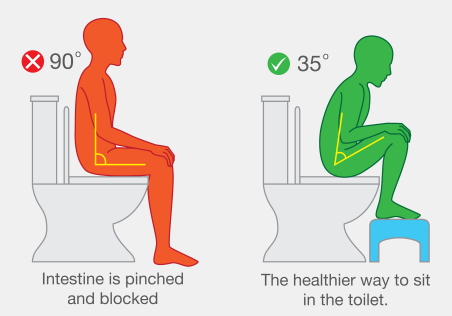Constipation in adults
Bowel motions
Different people need to pass a bowel motion (have a poo) at different times. For some people it is quite normal to have a poo 3 times a day, while for other people it is quite normal to go just 3 times a week.
If you need to have a poo more or less often than this, there may be something wrong.
Causes of constipation
Constipation can be caused by several different things.
- Not eating enough fibre. Fibre-containing foods such as wholegrain breads and cereals, nuts, seeds, fruit and vegetables will help to keep your bowels working regularly.
- Not drinking enough fluids.
- Holding on, rather than going to the toilet when you get the urge.
- Being immobile or not being active enough.
- Anxiety or depression.
- Side effects of some medications. These include some pain medicines (particularly those with codeine or very strong pain medicines, such as morphine, oxycodone and fentanyl), ondansetron, antacids that contain calcium, some antidepressants and iron supplements (there are many others).
- Some medical conditions, such as irritable bowel syndrome, and other gut disorders.
- Pregnancy. People are more likely to get constipated when they are pregnant.
It is uncommon for constipation to be due to bowel cancer but a bowel blockage (when you do not poo for several days and have a painful swollen tummy) may be due to this. This is different to constipation. If this happens, it is important to see your healthcare provider straight away as you may need to go to hospital for treatment.
Diagnosing constipation
It is important that you see your healthcare provider if you experience any of the following:
- a recent change in how often you go to the toilet — for example, if you have just become constipated and there seems to be no obvious cause
- bleeding from your back passage (bottom)
- alternating constipation and diarrhoea
- several days without having a poo or passing wind (farting)
- constipation that is not getting any better after about 4 to 6 weeks of home treatment.
Your healthcare provider is likely to ask you questions about how often you go to the toilet, what you eat and how active you are. They may ask you to complete a bowel diary. A bowel diary records information such as how urgent your need to go to the toilet is, the time and effort needed and any accidents you have.
They may also examine you. This examination may include a check of your abdomen (tummy) to feel that your organs are normal.
If they think you may have faecal impaction, they may do a rectal examination. This involves putting one finger gently into your anus (bottom) to feel for hard poo.
They may also check you do not have any other disease or condition that might be causing your constipation. You might need a blood test.
Self care for constipation
There are many things you can do yourself to try to deal with your constipation. Try the self-help advice below. If it does not make a difference within 4 to 6 weeks, see your healthcare provider.
Diet
Eat a diet high in fibre and drink plenty of fluids. This can help relieve constipation and stop you getting constipated again. If you are already eating plenty of fibre-rich foods and drinking plenty of fluid, adding more probably will not help. In this case, see your healthcare provider.
Be active
Find ways of being more active. This is important for your general health and wellbeing and may also help you keep your bowels regular.
Going to the toilet
Go to the toilet when you get the urge to move your bowels. If you hold on, it might be more difficult to go later.
Do not sit on the toilet too long. Sitting for longer than 10 minutes can put pressure on your rectum and cause haemorrhoids or a rectal prolapse (when the large part of your large intestine slips outside your anus).
Sit in the correct position:
- Sit comfortably on the toilet seat with your knees about hip distance apart and your feet flat on the floor.
- Your knees should be slightly higher than your hips. If the toilet seat is quite high you could use a small footstool or a pile of books under your feet.
- Lean forward a little and rest your forearms or elbows on your knees.
- As you lean forward make sure your spine is straight.
- Try to breathe to the bottom of your lungs with your mouth slightly open to prevent straining.
- Relax and push out your stomach.

If you continue to have trouble with constipation after trying this advice, talk to your healthcare provider about medicines to treat constipation. Keep in contact with them to monitor your progress and adjust medicines if needed.
Treating constipation
Eating and lifestyle measures can help you get over constipation and stop it from happening again. If these changes do not help, your healthcare provider may prescribe a laxative to help your bowels move.
Clinical review
This content was written by HealthInfo clinical advisers. It has been adapted for Health Information and Services.